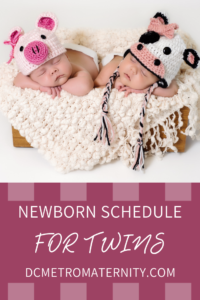Finding out that you’re pregnant with twins brings a lot of emotions. Joy at the new lives your creating. Surprise. And possibly a tinge of anxiety and overwhelm. Two newborns are a lot of babies. Certainly a lot more than one baby. How are you going to manage twins?
I have good news for you, if you like to avoid chaos, and are giving birth to twins:
Many families with newborn twins thrive by keeping them on similar schedules for sleeping and feedings.
That’s right, you can have your babies, and your sanity too!
So how does a routine for twins work?
The key to getting twins to be on approximately the same schedule is to feed them at as close to the same time as possible.
Why focus solely on eating? In the early days, your newborn twins will sleep a lot when they come home from the hospital. That’s true of any babies, but can be especially true of twins, as they are often smaller, and/or born at an earlier gestation than singleton babies.
Because of this, it’s common for you to need to wake one or both of the babies in order to ensure that they eat. Many parents of newborns, particularly those who are breastfeeding, feed their babies on demand. But parents of smaller babies or those born early are often encouraged to feed them more frequently than the baby would otherwise show hunger cues.
Always defer to a pediatrician, lactation consultant or your other healthcare provider, but on average, feeding newborn twins at least every 2.5-3 hours is a good idea.
Since you likely need to wake them to eat, you have an opportunity to create a routine for your twins.
Simply feeding them at or near (we’ll talk about each shortly) the same time, you’ll create a routine where the babies eat together and therefore fall back asleep at near the same time. It’s really that simple to start to shape a routine where you’re not feeding twins round the clock at random intervals.
Making eating times predictable sets the stage for everything else. While this doesn’t eliminate the need for changing two diapers, giving two baths and learning to tell the babies apart, if you’re already feeding them together, you’re more likely to do other newborn care tasks in a routine for the twins.
A routine for twins making feeding and sleeping being more predictable is a major win.

So what does feeding the babies on the same schedule look like, practically? It depends on whether you tandem feed, or feeding one baby and then the other.
First, let’s talk about feeding twins at the same time. You can do this with either breast, bottle or a combination.
Some mothers decide to breastfeed both twins- this is called tandem nursing.
Usually as newborns, this means that each baby will be in the football hold and placed at the breast. Pillows often help with this arrangement. We’ve had twin mom clients who like the Twin Z nursing pillow or My Brest Friend twin nursing pillow. You can also support yourself and your babies with pillows you have around the house.
If you’re giving your babies bottles, whether of pumped milk or formula, as newborns it’s often easiest if you have your partner, doula or other support person help you.
We can feed one twin while you feed the other. As the babies grow, you will likely be able to give them bottles at the same time, either in swings or bouncy chairs, by holding them both in your lap, or in an arrangement where they’re propped up such as with the Twin Z pillow.
Once the babies have eaten, they can be burped and swaddled, then placed back down to sleep when they’re settled and calm. This is another moment where having support can be helpful to a mom with two newborns.
Tandem nursing might seem overwhelming, and that’s okay.
It’s a lot of sensation at once, two babies’ positions to adjust, and if you’re tracking information to ensure they’re eating enough, tandem nursing means two eating times to keep track of at once.
Some parents of newborn twins choose to feed one baby, then the other.
You’d still make a point to wake both to eat, but it may mean that the first twin eats at 5:30 and the next eats at 5:50, instead of say, both at 5:30. If you’re feeding the twins one after the other, know that the whole process will take a bit longer, and you’re likely to have one consistently wake up sooner than their twin. That’s not a bad thing, as long as everyone gets what they need.
We recommend having everything ready for both twins before you wake one up.
This includes diaper changing supplies, bottles prepped and warm (if you’re bottle-feeding) or anything you’ll need for nursing, such as a snack and water. It’s common when the twins are on a close schedule but fed consecutively, for one to wake while the other is feeding, and cry. This means that you can expect to finish feeding one baby, burp and put them down, while the other baby is fussing.
The good news is, that babies are resilient, and can wait a bit, even they cry.
By creating the feeding and sleeping routine for them, you’re teaching your baby that you will care for them and meet their needs. While they may cry (because all babies tend to do that) while they wait for their twin to finish, you know that they’re still loved and well taken care of. And over time, as they grow in attachment to you and get through the fourth trimester, they’ll know this as well.
If all this seems like a lot to manage, it is. But twice the baby does mean twice the love.
And thankfully modern technology has made it easy to keep track of who ate first and on which breast, or who is needing more milk in their bottle.
Use an app to keep track of all the things your twins are doing and get an idea of how the routine is suiting each of them.
Or favorite apps is BabyConnect. We’ve also had clients who enjoyed Baby Tracker and Sprout.
And remember, you absolutely deserve help and support. You don’t have to muddle through early motherhood alone. Reach out to your postpartum doula, your partner and your friends. Someone will be happy to feed a baby with you.



Hi, the Newborn Twins Routine article it is well written and is very useful.
Have you heard about this new way to make your baby
fall asleep in minutes? – http://bit.ly/Gets-Your-Baby-to-Sleep
Your baby is wonderful!! 🙂 Kiss you All!